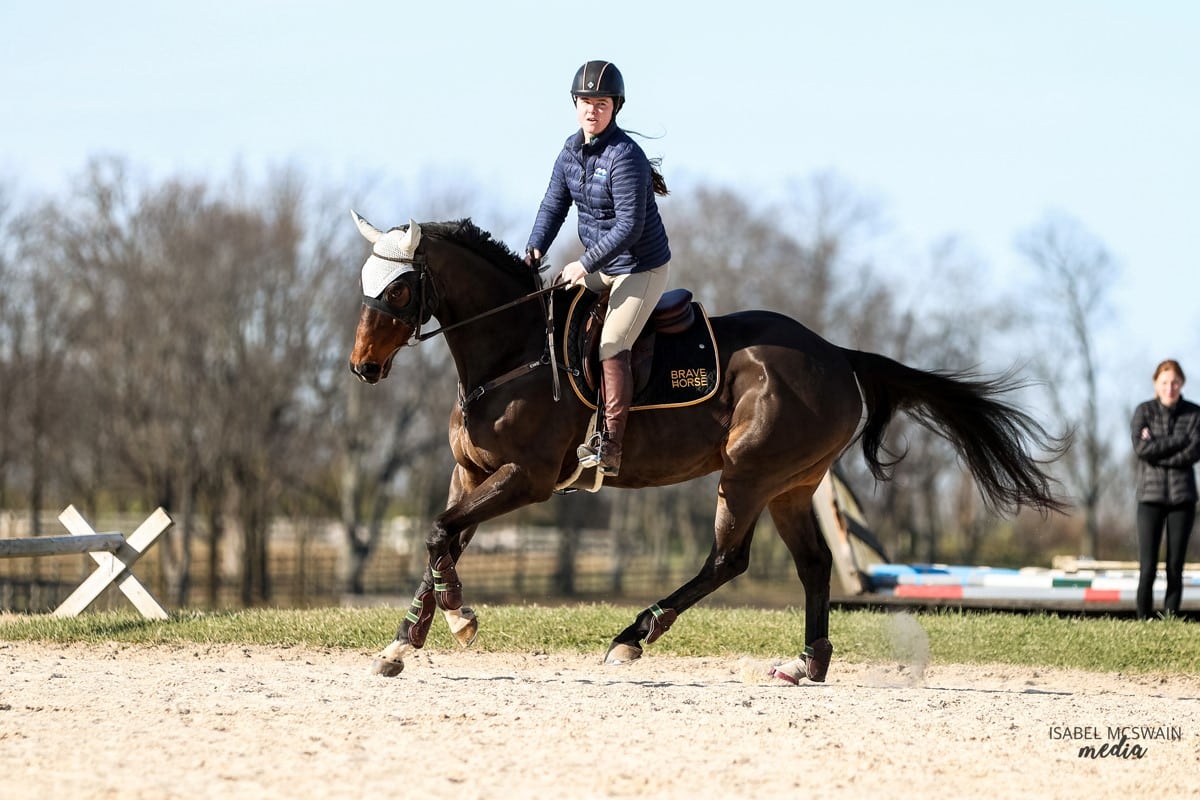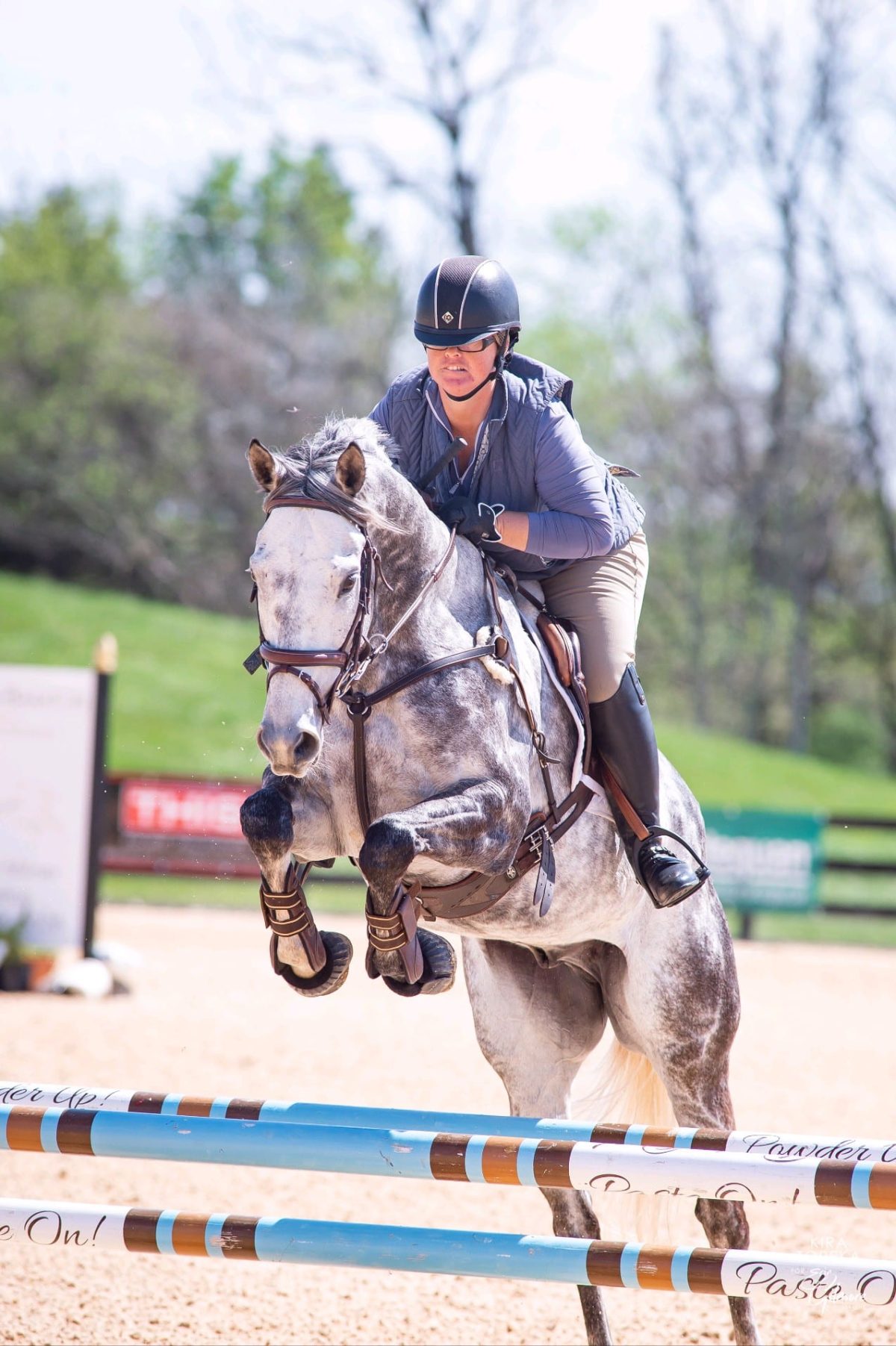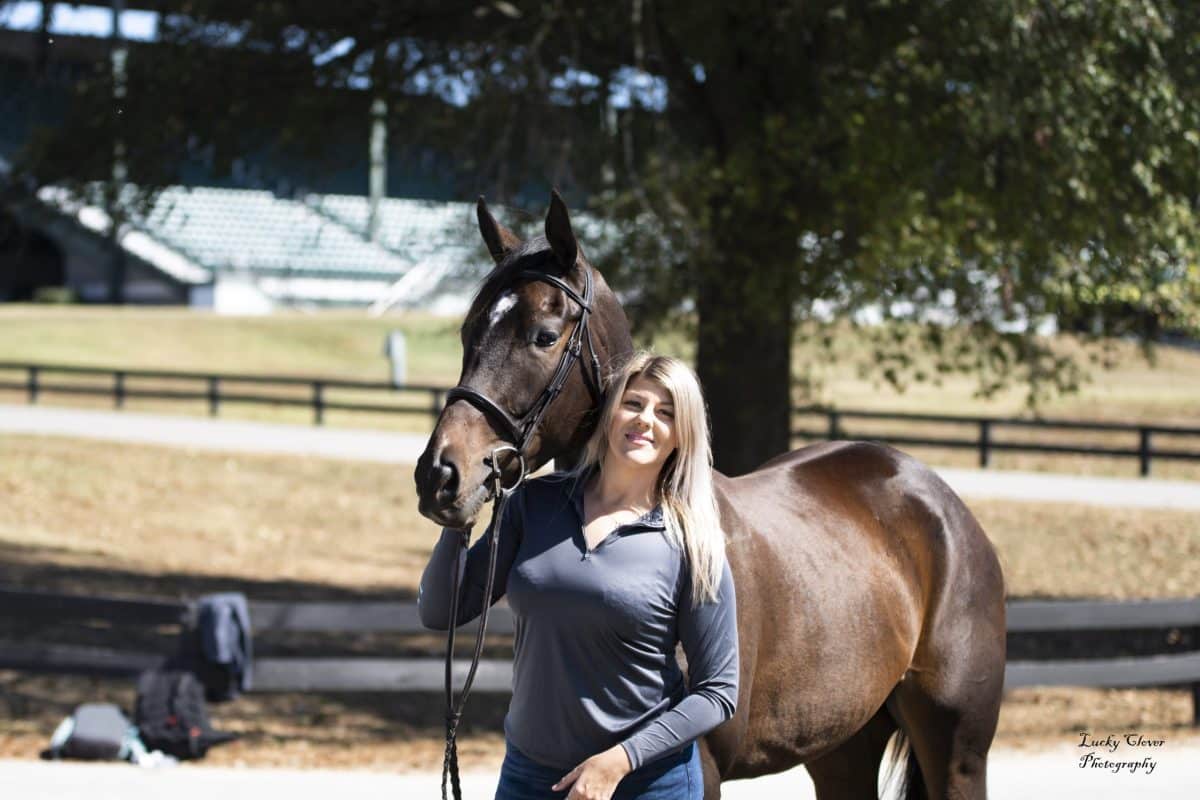It was Easter evening, and Rachel Showers, a nurse practitioner, adjunct graduate nursing professor and business owner in Lockport, New York, had just finished working 36 straight hours. She was exhausted on every level, but her to-do list wasn’t complete yet. She hadn’t seen her 2019 Makeover graduate Raging Saint (Zensational — Raging Beauty, Saint Ballado) in days and needed “some Saint time.”
“I ran home, changed my clothes quickly and drove 40 minutes just to spend time with him in the arena, doing some horsemanship and in-hand work,” Showers recalls. “He was so happy just to be present and hanging out with me.”
She says that time together, even if she’s just sitting outside Saint’s stall, is imperative to both her and the horse’s mental and physical health and overall happiness.
Showers is not unlike so many of us working-adult off-track Thoroughbred owners. We juggle jobs (sometimes several), parenting, pets, chores, family obligations and the rare social outing with riding and training our horses. While it’s not easy, it’s more than worth it. All the horsewomen in this article will tell you the precious time they get to spend with their horses makes up for every long day and overbooked schedule. Here’s how they make it work.
Time Management: A Must

Amy Arzonico keeps four OTTBs at her home in Paris, Kentucky. She’s also earning her master’s in accounting, raising a border collie puppy and maintaining a long-distance relationship with her boyfriend. Courtesy Amy Arzonico
The key to balancing real life and horse life is time management and smart scheduling. Melissa Fox, a registered nurse who’s studying for her family nurse practitioner license and is the mother of a 5-year-old boy, knows this well. Between work, academics and parenting (further, her husband is a firefighter who works 24-hour shifts), she commutes the half-hour to her family’s Leesburg, Virginia, farm to ride her 2022 Makeover prospect, Rogue Patriot (Two Step Salsa — Signora Gina, Belong To Me).
“Because I don’t live on the farm where my horses live, remembering to use travel time efficiently is still a skill I’m trying to master,” she says. “Listening to nursing lectures on various topics that will help prepare me for the certification exam is helping with my time management needs.”
Fox credits her nursing background with giving her the skills she needs to pack everything into one day. “Time management and prioritizing tasks are an essential part of the nursing profession, which can easily turn a 12-hour day into a 16-hour day if not done properly,” she says.
She also lives by schedules. She recommends busy riders create detailed daily itineraries — down to the hour — that include not only work, errands and riding but also meals and travel time.
Amy Arzonico, sales coordinator and office manager for Bluewater Sales, a Thoroughbred breeding and sales consignor in Lexington, Kentucky, can relate. “I schedule obsessively,” she says. “Anything that is not on the schedule just does not happen, plain and simple.”
Arzonico keeps four OTTBs — a 2022 Makeover hopeful, a broodmare and two show horses — at her home in Paris, Kentucky. She’s also earning her master’s in accounting, raising a border collie puppy and maintaining a long-distance relationship with her boyfriend.
“I communicate a lot with my professors and professionals,” she says. “I try to make my schedule and capabilities very clear to everyone I work with.”
For Fox, scheduling helps her fit all her obligations into one day or week, while also meeting her personal and professional goals.
“Determining goals is a very important step in time management for my riding life,” she says. “Sitting down and making weekly and then monthly goals allows me to plan out my days more efficiently. Knowing my work schedule a month in advance also allows me to plan the rest of my life accordingly. Although I have very ambitious career goals that include owning my own medical practice one day, I still value the importance of my riding goals and my horses.
“There are days where the horses are off because there’s not enough time or light in the day,” Fox adds. “Factoring those days into their riding schedules is key to having some success working toward goals. Another key is being able to be flexible and adjust to unexpected changes.”
She also ensures she dedicates herself fully to whatever it is she’s doing throughout the day. “If I’m riding and training my horse, then I’m fully focused on that task and not thinking about the other things that need to be completed that day,” Fox says. “It’s very easy to get distracted by other things when you have a lot on your plate.”
Or, as Arzonico says, don’t sweat the small stuff. “If my shed row is not swept at the end of the day, it is not the end of the world.”
Building a Support System

Between work, academics and parenting, Melissa Fox commutes the half-hour to her family’s farm to ride her 2022 Makeover hopeful, Rogue Patriot. Courtesy Erin Gilmore Photography
Working adults don’t have to go it alone. Just as it takes a village to raise a child or retrain an ex-racehorse, it takes a supportive team to help you accomplish your goals both in and out of the arena.
Showers says her trainer helps her successfully balance OTTB ownership and her career. She keeps Saint in a consistent program with Leigh Fischer at High Time Stables, in East Aurora, New York.
“I have, in my adult years, been very lucky to find a phenomenal trainer and horsewoman,” says Showers. “It is imperative that you find a coach that you trust; one that understands the needs of both you as a rider and your horse. During busy times I send the assistant trainer my schedule for the month, and we make a plan for training days, longeing days, lesson days and off days. Consistency and communication with your team is key!”
Arzonico surrounds herself with a team of understanding horse professionals who help her check the many equine tasks off her to-do list. “My vet, Dr. [Bradley] Kidney at Hagyard [Equine Medical Institute, in Lexington], has met me plenty of times in the evening after work hours,” she says. “My farrier, Stan Mullen, is more than happy to pull the horses out of their stalls and shoe them in the crossties. These are small things, but they make a huge difference when it comes to time management.
“My suggestions for other people in this position are to speak up about what you are actively needing from service providers, co-workers and classmates,” she adds. “There is no point in running ragged to do everything halfway. Therefore, you must communicate.”
Fox credits her co-workers, husband, family and friends with helping her complete her bachelor’s degree in nursing while working full-time, raising a toddler and competing her horses.
“If my child becomes sick, for instance, I may have to depend heavily on my family or friends to help me with both my family obligations and the obligations I have to my horses,” she says. “My mom and I are the sole caretakers of the horses, so we work together to get everything done for them (when my schedule is hectic). Without her support my journey to the Makeover and competing successfully wouldn’t be possible. We spent a lot of evenings at the indoor during the winter, and there were a lot of late nights!”
Horse Therapy

Rachel Showers says she leans on her trainer to help keep her and 2019 Makeover graduate Raging Saint in top form while juggling her busy career. Lucky Clover Photography, courtesy Rachel Showers
Why do we push ourselves to our limits and sacrifice time with family and friends to ride and train our OTTBs? Because they’re our therapeutic escape from the daily stresses of our lives.
“It’s not just important to make time for horses, it’s vital — vital for me in regard to my mental health,” says Showers. “It becomes very apparent if I have spent too many days away from my horse or just the barn in general. So much so that my other half will comment, ‘When’s the last time you went to the barn? When did you ride last? You should go!’ I need the outlet. I need that time, and I need that connection with my horse; it is so therapeutic and rewarding.”
However, make sure everything you cram into your days, weeks and months is worth it. “At the end of the day, you have to do what makes you happy,” says Arzonico. “If you are struggling with your responsibilities, you need to take a step back and reevaluate. If that means only hacking instead of schooling over fences or taking fewer classes a semester, then so be it.”
Tips From Fellow Trainers
Amateurs comprise a large portion of the Retired Racehorse Project’s trainer pool. Here’s some advice for balancing life and horses from previous and current competitors:
“If you can do a team entry with another person, I highly recommend it! We were able to split all the fees, entries and riding time. It’s so beneficial, because if I got tied up with work, family obligations or life in general, my best friend (Megan Barham) could just pick up the slack with the horse and vice versa. I am proud to say we were Top Team in Show Hunters in 2019 and Top Team in Show Jumpers in 2021.”
Courtney Poole | Manager, Specialty Practice at BAYADA Home Health Care, in Locust, North Carolina
Other commitments: Volunteer director of a family deaf camp (Poole has hearing loss and communicates via lip-reading, spoken language and cued speech); volunteer board member for the National Cued Speech Association; and pregnant with her first child.
“Keep a positive mindset, and keep going! It is so easy for us to be too hard on ourselves. The little small goals all add up in the end. I feel a smaller goal that you know you can achieve is much more productive and constructive for both the horse and rider than rushing or pushing too hard, especially if you are pressed for time for your ride.”
Nicola Field | Executive assistant for a nonprofit in High Springs, Florida
Other commitments: Two children, a partner and retraining four to eight OTTBs per year.
“The best time management advice I have is to download a good calendar app on your phone and to plan ahead as much as possible. The only way I can ensure I don’t double-book is by color-coordinating everything in my calendar. I try to run errands, grocery shop and work around the house on bad weather days so I’m free to spend as much time at the barn when the weather is nice.”
Kim Sperbeck | Patrol Corporal and K9 handler for a municipal law enforcement agency in Gilbert, South Carolina
Other commitments: Single mother to an 8-year-old son who wrestles and does mixed martial arts; substitute teacher; working toward her master’s degree.
“Schedule your horse time just like you would a social commitment or a club you do weekly or monthly. Take the time to leave everything the way that you want to find it when you go to the barn next: Clean tack, clean trailer and a well-curried horse just save you time on the next visit. Also, if you have a horse appointment like the vet or chiropractor, take the whole day off and fit in your ride while you’re there.”
Lindy Gutman | Veterinary pharmaceutical sales professional in Westminster, Maryland
Other commitments: Foxhunting, spending time with her husband and caring for two large dogs and a mini pig.


